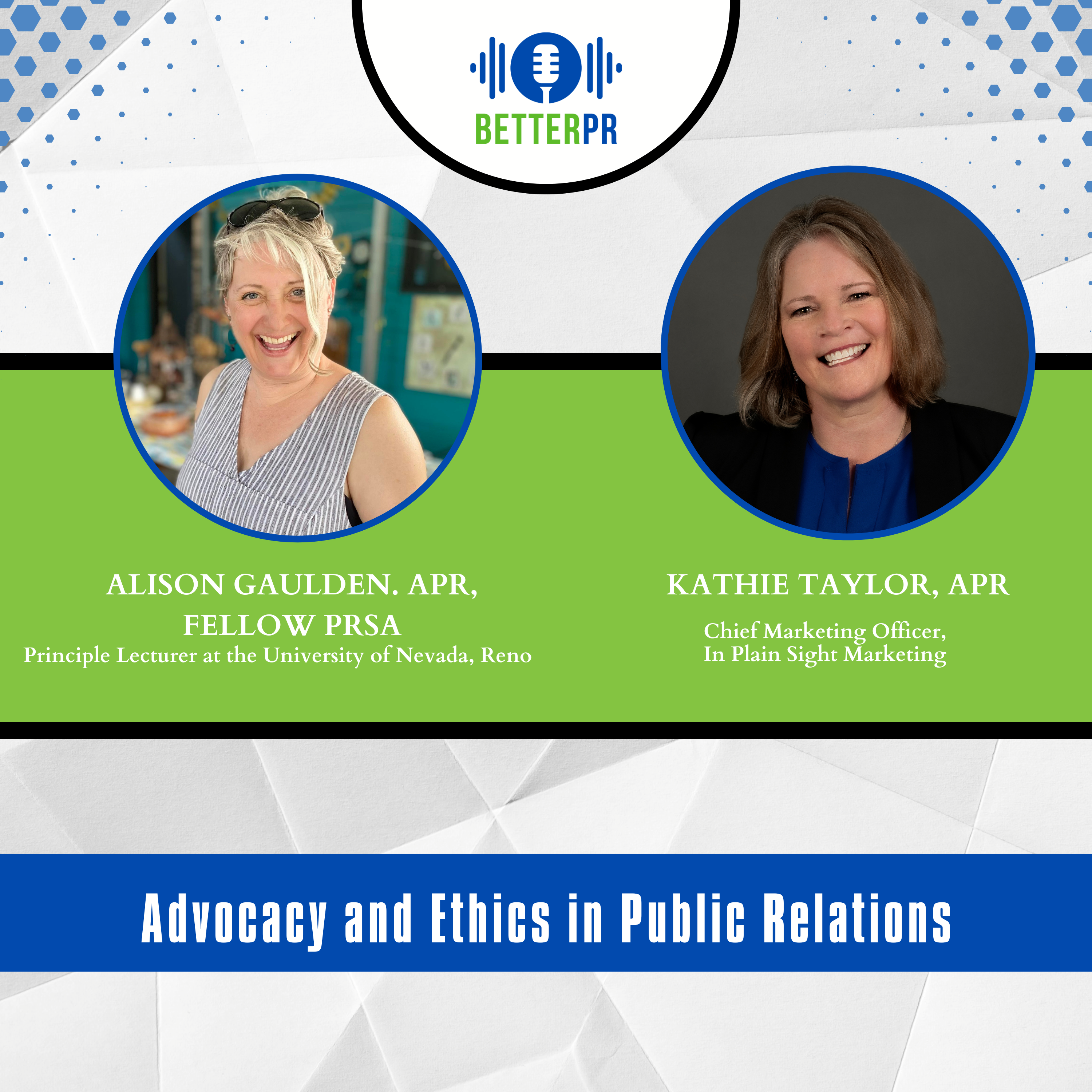In this episode of BetterPR, we dive into one of the most crucial aspects of public relations: ethics and advocacy. Join host Kathie Taylor, APR, as she sits down with Alison Gaulden, APR, Fellow PRSA, a seasoned public relations professional and professor at the University of Nevada, Reno’s Reynolds School of Journalism, to explore how ethical PR practices can elevate both your career and your clients.
The Importance of Ethics and Advocacy in Public Relations
Alison began by emphasizing the importance of revisiting the Public Relations Society of America’s (PRSA) Code of Ethics regularly, describing it as essential reading for PR practitioners. As she pointed out, ethical behavior is not always a question of right or wrong—it is about being mindful and transparent in a world filled with misinformation and disinformation.
“We need to be the champion and conscience of our clients or organizations,” Alison stated. Her words reminded us that to advocate effectively, PR professionals must ensure their actions are aligned with ethical standards and that they are transparent with clients and the public. Advocacy isn’t just about advancing a client’s message; it’s about representing that message truthfully and responsibly.
Navigating Ethical Dilemmas
Our conversation took a deeper turn when Kathie shared an example from her own agency’s experience. She and her partner faced an ethical dilemma when deciding whether to work with a political figure who had previously voted against their project. Their decision-making process involved weeks of discussions about how to maintain integrity and separate their roles in different projects.
Alison underscored the importance of such discussions, noting, “If you can’t love it, live it, and breathe it, then you really have to consider how you can be that champion or conscience.” This statement resonated with anyone in PR who has ever faced a tough ethical decision. It’s a reminder that we must not only be comfortable with our clients’ causes but also with how we represent them.
Advocacy Beyond Clients: Elevating the Profession
One of the key takeaways from our discussion was that ethics and advocacy in public relations extend beyond client representation. Alison stressed that PR professionals should also be advocating for their profession by promoting ethical practices and calling out unethical behavior.
This segued into the importance of accreditation in public relations (APR) and the role it plays in building a stronger, more ethical industry. “I think practitioners should be accredited in PR,” Alison said, explaining that the process of earning an APR ensures that PR professionals remain committed to both the profession and ethical standards.
The conversation about accreditation also touched on the need for senior practitioners to continue pushing for industry excellence by becoming thought leaders and mentors. “It’s all about ensuring integrity, honest practices, and transparency,” Alison noted. For senior PR professionals, applying for PRSA’s College of Fellows serves as a powerful way to reinforce their commitment to ethics and excellence.
Outputs vs. Outcomes: Measuring Success in PR
A key challenge for PR professionals is often how to measure success. During the podcast, we explored the difference between outputs and outcomes. While outputs measure the number of actions taken—such as press releases sent or media pitches made—outcomes focus on the results of those actions.
“The real measure is what’s the result of all that work,” Alison explained. This shift in focus from simply completing tasks to understanding their impact is crucial for advancing the profession. It’s about determining how well your communication strategy benefited your client, whether that’s through increased sales, voter turnout, or community support.
The Future of Ethics and Advocacy in PR
Our conversation wrapped up with a forward-looking discussion on the role of PR professionals in advocating for change within the industry. Alison emphasized the need for more collaboration, transparency, and strategic thinking in public relations.
In an increasingly complex world, PR practitioners must be the ethical voice that cuts through the noise. Advocacy isn’t just about promoting a message—it’s about building trust, fostering relationships, and holding both ourselves and our clients accountable to the highest standards.
Final Thoughts
Ethics and advocacy in public relations are multifaceted. It involves not only advocating for clients but also for the profession and for ethical standards that benefit society as a whole. Alison Gaulden’s insights remind us that being a successful PR professional means being mindful, ethical, and committed to transparency in all we do.
If you missed the episode, be sure to listen in and join the conversation. And don’t forget to subscribe to BetterPR for more expert insights into the world of public relations.
Listen to the full episode of BetterPR featuring Alison Gaulden here.
For more information on accreditation and how to become a stronger advocate for the PR profession, visit the PRSA website.
Read our blog post, 4 Reasons Marketing and PR are Essential for Small Businesses to learn why your business needs public relations!

